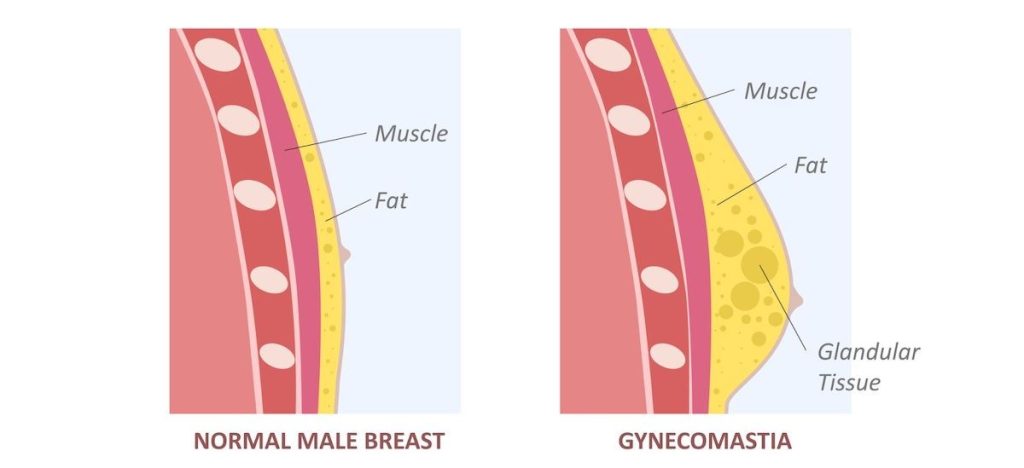Table of Contents
Gyno, or gynecomastia, or “man boobs,” is a condition in which men have enlarged breasts because of excess tissue growth. While the cause of gyno is not always clear, and if it will gyno go away on its own is not always the case.
Gyno can cause physical discomfort and emotional distress for those affected by it. A frequent question we get is, “Can gyno go away on its own with no medical intervention?” This is more likely if the condition is caused by a temporary issue such as hormonal imbalance or drug use. If the underlying cause has been addressed and corrected, for example, significant weight loss, the enlarged breast tissue may regress. Of course, that may depend on the gynecomastia stages and where you are on the scale of one to six for severity.
Will gyno go away on its own may seem like an attractive option. In some cases, this isn’t necessarily the best course of action as risks are associated with leaving it untreated. Therefore, it is best to seek professional medical advice before deciding how to proceed with treatment for this condition and to learn more if gyno will go away without treatment.
Causes of Gyno
Gyno, or gynecomastia, is a condition in which men have enlarged breasts because of excess tissue growth. While the cause of gyno isn’t always straightforward, several potential causes may contribute to its development. These include:
- Hormonal imbalances
- Obesity
- Certain medications
- Liver or kidney problems
- Heredity
- Anabolic steroid use
Hormonal imbalances can occur due to age-related changes or as a side effect of drugs, such as anabolic steroids or marijuana. Certain medications, such as chemotherapy drugs and antidepressants, can also trigger gyno sometimes. Finally, underlying medical conditions like liver or kidney disease can interfere with hormone regulation, causing gynecomastia to develop. Another question to ask is will gyno go away with weight loss or can gynecomastia go away with exercise?

Hormonal Imbalances
Hormonal imbalances are a common cause of gyno in men. These imbalances can occur due to age-related changes or as a side effect of drugs such as anabolic steroids or marijuana. When a man’s body produces too much estrogen, it can cause the breast tissue to enlarge and form gynecomastia. Hormonal imbalances can result from underlying medical conditions like thyroid problems or diabetes and lifestyle factors like smoking and binge drinking.
Hormonal abnormalities occasionally go away independently over time without any medical intervention. However, it is best to speak with your doctor if you believe a hormone imbalance may be the root of your problem for them to recommend treatment.
Testosterone Levels
Testosterone is an important hormone for men. It helps regulate many bodily functions, including sex drive, muscle mass, and bone health. Unfortunately, a man’s testosterone levels can decline with age or because of certain medical conditions. Low testosterone can lead to fatigue, low libido, depression, and decreased muscle mass. It’s worthwhile to discuss having your testosterone levels checked with your doctor if you exhibit any of these symptoms.
There are treatments to help you feel your best and restore balance to your levels. These include prescription drugs, hormone replacement treatment, and dietary and exercise changes. With the right treatment plan, you might feel like yourself again!
Estrogen Levels
All bodies need the hormone estrogen. All people, including men, can experience health issues due to much or insufficient estrogen. Both males and females have estrogen, a sex hormone. Females have higher quantities than males. The testicles, fat cells, and adrenal glands produce estrogen. The male reproductive system also depends on estrogen. The human body uses estrogen for a variety of additional purposes. It can support maintaining bone and heart health while lowering cholesterol. Additionally, it impacts the skin, other body tissues, and mood.
Although estrogen is necessary for the male body to operate properly, too much estrogen can have negative health effects. Infertility, erectile dysfunction, and melancholy are just a few of the symptoms that high estrogen levels can bring on. Researchers discovered that testosterone and estrogen levels were lower in men with cardiovascular disease. You can see how critical both hormones in balance are necessary for health.
Pituitary Gland Activity
Because of its ability to create hormones that control other glands in our body, the pituitary gland plays a crucial role in the endocrine system. These hormones affect growth, metabolism, sexual function, and other things. Serious health problems may result from the pituitary gland’s malfunction, which prevents it from generating enough of these hormones.
Fortunately, patients who suffer from pituitary dysfunction can receive treatment. Your doctor may advise hormone replacement treatment or drugs to assist in balancing your hormones, depending on your specific situation.
Adrenal Glands Activity
They produce and store hormones that regulate many of our body’s processes, such as metabolism, blood pressure, and stress response. When the adrenal glands don’t produce enough hormones or become overactive, it can lead to several health issues. Common symptoms include fatigue, weight gain or loss, headaches, mood swings, and insomnia.
Treatments for adrenal dysfunction depend on your specific case and may involve lifestyle changes such as reducing stress levels or dietary changes along with medication to balance out hormones. It’s important to talk to your doctor if you have an issue with your adrenal glands, so they can help diagnose and treat any underlying conditions.
Common Signs and Symptoms of Gynecomastia
The disorder known as gynecomastia results in an expansion of the male breast tissue. It might happen because of hormonal changes, getting older, gaining weight, using steroids, or having certain medical disorders. Gynecomastia is frequently characterized by swelling and sensitivity of the breasts, nipple enlargement, and areolar puffiness. Changing one’s lifestyle, such as exercising more and eating better foods or using medications to lower hormones that may be the problem, are the usual forms of treatment.
For more serious cases, surgery is another choice. Discussing gynecomastia with your doctor may be a health issue to identify with your doctor, who can find suitable treatment options.
Enlarged Breasts With Tissue Growth
Gynecomastia is a condition where enlarged breasts with tissue growth occur in men. This can be a source of embarrassment and even lead to a lack of self-confidence. Sometimes, although rarely, the condition may resolve independently without treatment. However, if the symptoms are persistent or bothersome, medical and surgical treatments can help reduce the size of your breasts. If you’re concerned about gynecomastia, speak to your doctor for more information about diagnosis and treatment options and if gyno will go away on its own.
Fatty Tissue In Breasts
Fatty tissue in the breasts is a common condition that affects both men and women. While it’s usually not serious, it can embarrass or cause self-consciousness because of its unsightly appearance. Fatty tissue in the breasts is caused by an accumulation of excess fat around the chest area, which can be due to factors such as weight gain, genetics, or hormone imbalances. However, if the condition persists or becomes unpleasant, medical therapies are available to help reduce the size of your breasts.
In most cases, the condition will gyno go away on its own without therapy. These include dietary changes, exercise, and medications like anti-estrogens. It’s important to speak with your doctor for more information about diagnosis and treatment options for fatty tissue in your breasts and learn if gyno will go away on its own.
Puffy Nipples
Puffy nipples are a common condition that can affect both men and women. It’s caused by excess fat, hormones, or genetics and can be uncomfortable or embarrassing for those with it. The good news is, in most cases, puffy nipples will gyno go away on their own with no medical intervention. However, if the condition persists or becomes bothersome, treatments are available to reduce the size of your nipples. These include dietary changes, exercising more frequently, and taking medications like anti-estrogens.
Speak with your doctor for more information about diagnosis and treatment options for puffy nipples and if gyno will go away without treatment.
Painful Breast Tissue Growth
Painful breast tissue growth can be an uncomfortable and embarrassing condition for men. It is caused by hormones, genetics, or other factors that can cause the breast tissue to become swollen and tender. Unfortunately, this type of growth rarely go away on its own and may require medical attention to reduce the pain and size. Depending on individual cases, treatments can include medications such as anti-estrogens or hormone therapy to reduce the growth. Diet changes and exercise can also help reduce inflammation. It’s crucial to consult a doctor as soon as possible if you have any severe or persistent breast discomfort to determine the best course of action for you and if you have more questions on if will gyno go away without treatment.
Diagnosis of Gynecomastia
When diagnosing gynecomastia, the first step is to consult with a doctor to determine if will gyno go away without treatment. They may order blood tests or imaging tests, such as an ultrasound or mammogram, to determine if there is an underlying cause of the condition. It is important to discuss any symptoms you are experiencing with your doctor to ensure that nothing else is going on that requires medical attention and if will gyno go away without treatment.
Depending on your case, your doctor may refer you to a specialist for further evaluation and treatment. It is important to seek medical advice early to know if will gyno go away on its own or to address any potential health risks quickly and effectively.

Can gyno disappear naturally?
Various factors to determine if will gyno go away without treatment, including hormone imbalances or an underlying medical condition, can cause it. Fortunately, gyno goes away on its own with no medical intervention in some cases. If the underlying cause of your gyno is related to hormones or medications, it may take several months to see improvement or even resolution of the condition. Will gyno go away on its own? Does gynecomastia go away in adults? Yes, it can; however, it’s important to seek medical advice regardless, as other treatments may be available that could help speed up the process.
Surgery may also be advised in some circumstances if the condition does not improve. To decide on the best course of action, it’s crucial to discuss your symptoms with your doctor and any potential therapy alternatives you may have to determine if will gyno go away on its own .
Will gyno go away on its own without surgery?
Gynecomastia, or enlarged breast tissue in males, is a typical disease brought on by several things, such as hormonal imbalances or an underlying medical ailment. Fortunately, gyno frequently resolves without surgery. Even though it can take several months to notice any change, getting medical attention is crucial because alternative treatments can hasten the process. In some circumstances, surgery might also be advised if the condition does not improve on its own.
It helps to discuss your symptoms with our doctor and look at your options. We offer a complimentary consultation for a variety of gynecomastia services.
Read More :

Dr.Babak Moeinolmolki
LA Cosmetic Surgeon Dr. Moein is board-certified by the American Board of General Surgery.

